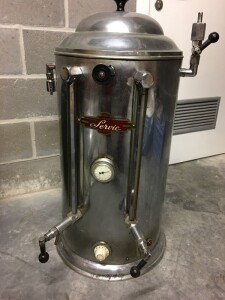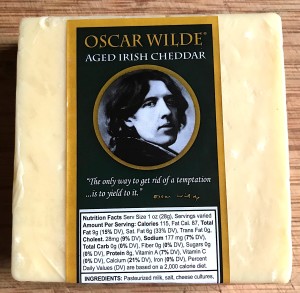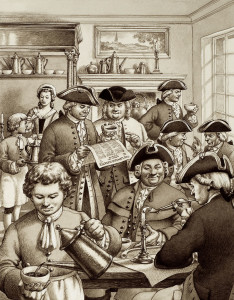In an issue dated June 4th1954 of Desiderata, the weekly publication ‘providing a direct link between library and bookseller‘ we find the following news snippet from the back page:
A Sussex bookseller has set up a coffee-bar at the back of his spacious shop with a counter, decorated in red and gold and equipped with the latest type of coffee machine, fitted into a tall bookcase. He claims, no doubt correctly, that it is the only coffee-bar to be found in any bookshop in the country and says, according to a press report, that in installing it he had in mind the coffee-houses of the 18thcentury “ at which it was customary for people interested in books to meet to discuss literature”.
A good idea, perhaps, but not our cup of tea.
The report does not state whether the unnamed bookseller/barista sold second hand books or new ones, or both, but since most of the content of Desideratais devoted to the ‘wants‘ of provincial libraries and second hand booksellers (the eminent dealer Charles Traylen is featured in this particular issue), we can reasonably suppose that the bookseller in question dealt in second hand books.
We have absolutely no idea why this dealer should be so certain that his shop was a pioneer in providing coffee, but the tone of the report seems to suggest that to the journalists who covered this story such a service was a great novelty. Nor are we told whether this coffee was offered free to customers as a sales gimmick, or had to be paid for. We at Jot 101 pose this question because we remember well back in the 1990s a certain book dealer in Hitchin, Hertfordshire ( alas now gone) who supplied comfy seats on which customers could drink their free cup of very good percolated coffee. This most welcome bonus only lasted a few years, but at the time your Jotter felt it to be a rather clever way of establishing good relations with the clientele. Before then and since coffee, when it featured at all in bookshops, which was rare enough, it had to be paid for.
We looked in vain on the Net for book dealers of the 1950s who might have emulated the Sussex dealer’s example, but good ideas in marketing are almost always copied in some form or other by rivals, so there must have been a few takers for this coffee ‘n’ books scheme. Certainly many dealers over the years have tried to inculcate in their premises an informality akin to that found in a private library. In the 1980s the legendary Shakespeare & Co on the Left Bank in Paris positively encouraged customers to become literary flaneurs by providing sofas for them to lounge around on. And an earlier Jot featured a certain bookseller in the USA who made her small shop a simalcrum of a some arty person’s back parlour, with tasteful bric a brac jostling for attention with rare books. [R. M. Healey]


